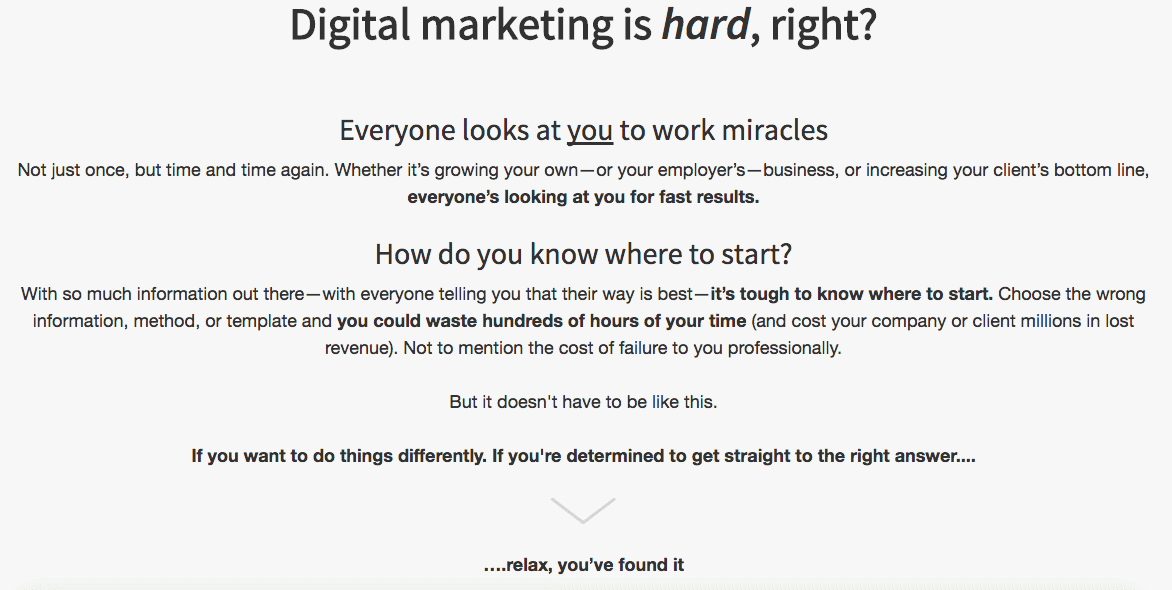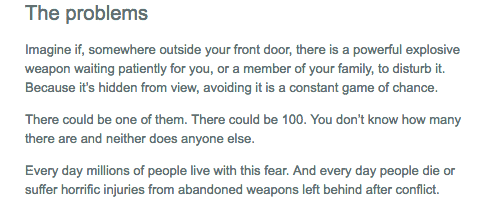A stellar design isn’t the only thing your website needs to stand out and engage your audience. It really all boils down to what you put on it. Writing web copy can be a challenge because it’s completely different from any other writing style.
But if you follow a few simple rules, you’ll be well on your way to creating effective copy that converts. Here’s everything you need to know about structuring and writing content for the web.
Structure
Put the important stuff first
Most people who visit your website do so with a specific goal: to get information or accomplish a task. If you don’t make what they’re looking for readily available to them, they’re likely to navigate away.
In web design, that means putting action-elements like login fields in a prominent place. For web copy, that means putting the most important information first. On a landing page, the most important information would be your value proposition. People want to know why your product is useful for them before they read details about its features.
Your headlines are another important focus. When people land on a page, the first thing they refer to is the headline to know if they’re in the right place. If you’re creating copy for your homepage or a landing page, your value proposition may serve as a great headline. For other pages on your site, make sure your headline clearly identifies what the page is about and what visitors can find there.
Make it scannable
People are busy, and don’t have the time, energy or interest to read every word of content on your pages. Make your content easier to digest by highlighting the main points.
Making your content scannable is mostly about formatting. Here are a few tips:
- Break up big paragraphs
- Use subheadings
- Bold important points in your text
- Use bullet points
Here’s an example of web copy (from Smart Insights) that does a good job of using formatting to make their content scannable:

Be mindful of SEO
No professional website should be stuffed with keywords, but you should still be mindful of SEO best practices when creating your content. Focus on using wording that delivers your message best, but take advantage of opportunities to optimize your content for SEO when possible.
Here are some of the places it’s valuable to include keywords in your content:
- Page title
- Subheadings
- In the first paragraph
- Naturally throughout the body text
- Alt tags
- Image file name
- Meta description
Make it focused
When a user visits one of your web pages, it should be easy for them to understand what it’s about. All the elements on a certain page should serve a single purpose. For example, you can have testimonials and case studies together on one page because they both serve as social proof for your product. But putting a product tour and your FAQ together doesn’t make sense and could confuse readers when they reach the page.
Start by setting a specific goal for each of your site pages (e.g. illustrate your product’s features), then create content that works towards that goal alone.
Make it visual
Pairing your written copy with visual elements has a lot of benefits for your site visitors. Research has shown when content includes images, people are able to remember 65% of the information after 3 days, compared to 10% for content with no images.
And as visual grows to become the dominant content-type on the web, people have come to expect it when they visit websites. Mobile users who visit your site don’t want to find a bland page full of text — they want visual elements to help their understanding of the content.
Stock images are a start, but there are plenty of other ways to include visual elements in your pages. Photos or screenshots of your products or team, informative video clips, graphs, and infographics can help make your pages more memorable as well.
Crypto20, for example, created a great visual timeline of their cryptocurrency mining process for site visitors:

Writing style
Consider your audience
If you want to write web copy that communicates effectively with all your site visitors, you need to consider the knowledge, needs, and expectations of your audience.
For example, it’s okay to use industry jargon on your site if your target audience is advanced-level professionals in your niche. A website for a dental practice wouldn’t want to use the term “resin infiltration” instead of the general term everyone understands: a filling!
If your business/product is novel, you may also need to create new jargon for it. Your content should help inform your audience about the meaning of these new words.
Write like you speak
Your web copy serves as your virtual salesman and customer service representative. Visiting a website can’t compare to chatting with a representative in-person, but you should do whatever you can to make the experience similar.
So stay away from bland descriptions or overly-salesy web copy. Instead write like you’re chatting with someone face-to-face. To do this, try writing your copy then read it out loud to another person.
Vary your sentences
Avoid creating repetitive web copy by varying the words you use and your sentence structure. Here’s an example of a paragraph that does this poorly:
Our agency is the best PR agency in Manhattan. Our goal is to help businesses become Manhattan’s most renowned. Our agency can help with a variety of PR tasks, including…
Change up the wording and sentence structure, and it sounds so much better:
They say we’re the best PR agency in Manhattan. We have a goal of making businesses the most renowned in the city. Our team can help with a variety of PR tasks, including…
Look for and eliminate repetitive words in your copy, especially at the beginning and end of sentences.
Avoid cliches
If you want your web copy to really stand out from your competitors, avoid clichés like the plague (including that one). Clichés aren’t just everyday colloquial sayings that you can easily pick out of web copy. Clichés can also be language specific to your industry/niche.
To test for this, try going through your web copy and substitute your business name with one of your competitors’. Does everything your copy says still make sense?
If it does, that means your content is too generic (too cliché for your industry) to stand out from the rest.
Be the expert
If you want your audience to pay attention to and value your web copy, you need to write like you’re the expert. Use an authoritative tone and state your claims as fact. No “We think our product is great because…” Instead use: “Our product is great because…” Then use statistics and other data to back up your points.
Jargon and complex writing doesn’t necessarily help you come off as an expert. Instead focus on creating sentences that illustrates confidence in your business/product.
Tell a story
Web copy can so often come off as bland. On the other end of the spectrum, it can seem obviously salesy. Storytelling is one way you can avoid both of these issues with your writing. Tell a story that engages readers while conveying all the information you need.
Here’s an example of great storytelling from NGO MAG International’s “About” page:

Storytelling is a very captivating way to describe what your business (or in their case, NGO) is all about.
Use positive language
If you want readers to remember your website in a positive way, then focus on using positive language in your text. Copywriters often fall astray with this when trying to address audience pain points. Compare Wasting too much time on social media marketing? Try our new tool! to Save time and get ahead with social media marketing. Try our new tool!
Negative language is a valuable tactic you can use to help illustrate the need people have for your product/services. Just make sure 90% of your web copy focuses on good things about your product, not bad things about not having it.
Use simple language
School is the first place most of us learn professional writing. The more complex language you use for your English essay, the smarter you sound, right?
But writing for the web is a different animal. There’s no need to use unnecessarily complex vernacular when simple, common words will do the trick. Also the more jargon you use in your web copy, the more likely you’ll alienate some of your site visitors who aren’t familiar with it.
Other Considerations
Write, then cut down
Writing is a process. You try to create sentences that get your message across, and 9 times out of 10, they end up being more complex than they need to be.
That’s why you should always edit down your web copy. Create a draft, then look for opportunities to break up your sentences or make them shorter. In some cases, whole paragraphs can go from your copy because you’re being repetitive. Write, then cut down.
Get help when you need it
Not all of us are writers. Yet some business owners still insist on writing their own web copy when they really shouldn’t. If writing isn’t your strong point, then enlist the help of others. You want your web copy to be memorable and help drive your marketing goals, and professional writers are positioned to help.
Of course, writing isn’t the only part of creating web copy you might need help with. Keyword research, on-page SEO, and creating unique visuals are all advanced tasks that you want to do right.
Wrapping up
Your website may only exist on computer screens and mobile phones, but it’s still an amazingly powerful tool to communicate with your audience and encourage them to act. All you need to do is create compelling copy that’s easy to digest and works towards your marketing goals. These 15 rules are all you need to make it happen.

